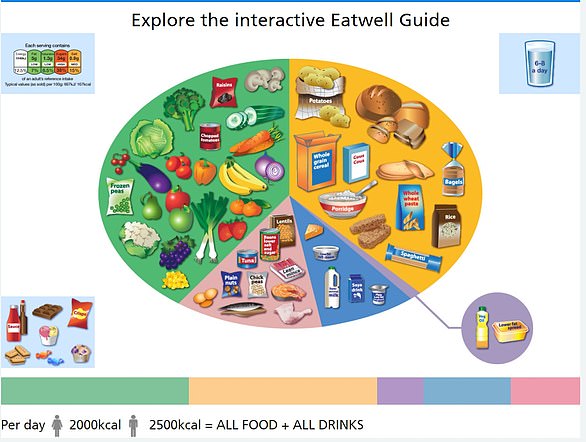Gruesome AI images show what men will look like in 30 years as a result of a diet of ultra-processed foods
His shoulders are hunched, no doubt struggling under the weight of his huge, swollen belly and hanging ‘moobs’.
His skin is riddled with acne, his legs are swollen and infected with sores, and he stares fearfully through yellowed eyes with dark rings.
Meet Michael, who is not, as he may seem, a character from the latest horror movie or mafia-inspired crime series.
In fact, he is an AI-generated image of what the average British man will look like in thirty years if diets continue to be heavy on junk food.
And the result of decades of bad eating is not pretty. Aside from the obvious horrors caused by his morbid obesity, his health suffers in other ways.
Michael has asthma, depression and anxiety, and he has trouble sleeping – all problems that are both caused and exacerbated by being overweight.
And he’s at risk for type 2 diabetes and heart disease, leaving him susceptible to a heart attack or debilitating stroke.
The ‘model’ was created as part of a report carried out by recipe box Gousto.
Meet Michael, an AI-generated image of what the average British man will look like in thirty years if diets continue to be heavy on junk food
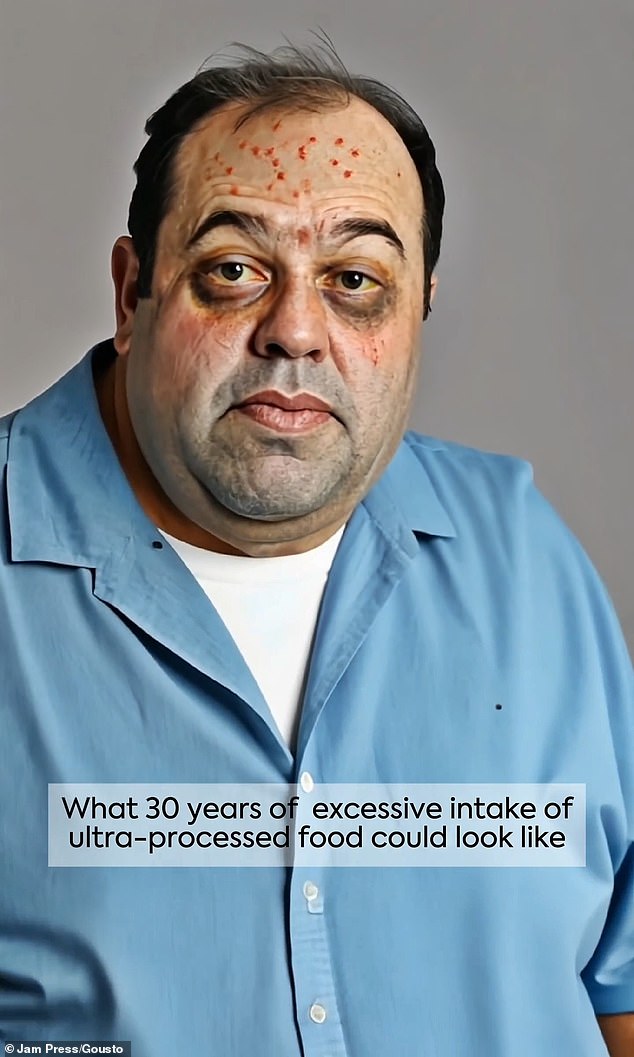
His skin is riddled with acne, his legs are swollen and infected with sores, and he stares fearfully through yellowed eyes with dark rings.
Their research hopes to raise awareness of the long-term effects of today’s eating habits and shine a light on unhealthy eating in Britain.
In recent decades, ultra-processed foods – which are manufactured to a very high standard and loaded with additives – have become a staple of the modern British diet.
Growing evidence suggests that fizzy drinks, biscuits and ready meals are responsible for a range of health harms, including cancer.
People who eat diets high in UPFs also die younger, research shows.
But shockingly, these foods make up 57 percent of the average adult’s diet, and even more disturbingly, 66 percent of a child’s diet.
And Britain consumed more UPFs than any other European country, official data shows.
Obesity rates have soared in recent decades, with the most recent data showing that a total of a quarter of adults are obese – with excess weight at levels known to increase the risk of disease.
In some British areas this rises to almost half of the local population.
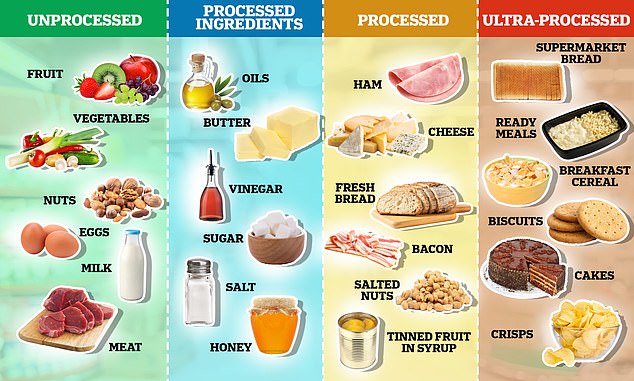
The Nova system, developed by scientists in Brazil more than a decade ago, divides food into four groups based on the amount of processing it has undergone. Unprocessed foods include fruits, vegetables, nuts, eggs and meat. Processed culinary ingredients – which are not usually eaten alone – include oils, butter, sugar and salt
The figures for children are also worrying, with 15 percent – or one in eight – of two to fifteen year olds classified as obese.
According to a poll conducted by Gusto, almost two-thirds of Brits are unaware of the long-term effects UPFs have, despite three-quarters saying they want to eat healthier but don’t have the time or money to do so.
General practitioner and media commentator Dr Hilary Jones said: ‘Ultra-processed foods are not necessarily harmful, but when they dominate our diets and replace fresh, nutrient-rich foods, they can increase the risk of long-term health problems such as cardiovascular disease, metabolic disorders and nutrient deficiencies.
‘A balanced diet full of fresh, whole ingredients is essential for preventing chronic conditions and supporting overall health.
‘Cooking from scratch is one of the most effective ways to minimize our ultra-processed food intake and maintain a balanced diet.’
The impact of ultra-processed foods is a growing concern among top UK experts – as some suspect these foods may contain ingredients that are causing an increase in cancer rates under the age of 50.
Professor Charles Swanton, oncologist and chief medical officer at Cancer Research UK, recently highlighted the emerging links between the ‘disturbing’ pattern and ultra-processed diets.
Speaking at the American Society of Clinical Oncology last year, he said studies have shown that some early-stage colon cancers can be “initiated” by bacteria in the gut that are common in those who eat low-fiber, high-sugar diets.
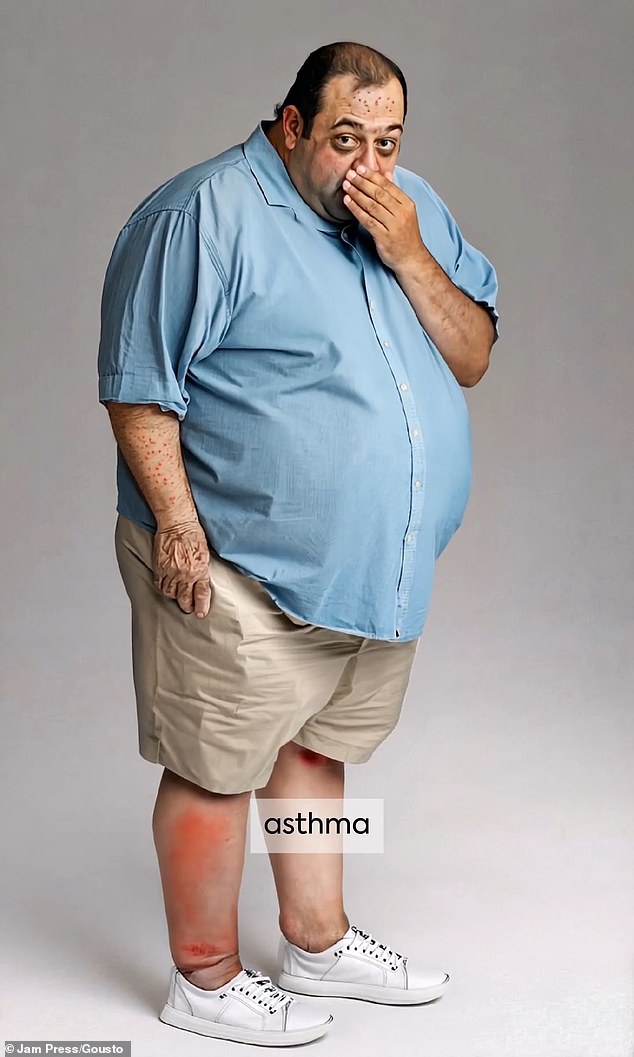
Michael suffers from asthma – a condition both caused and exacerbated by obesity, studies have shown
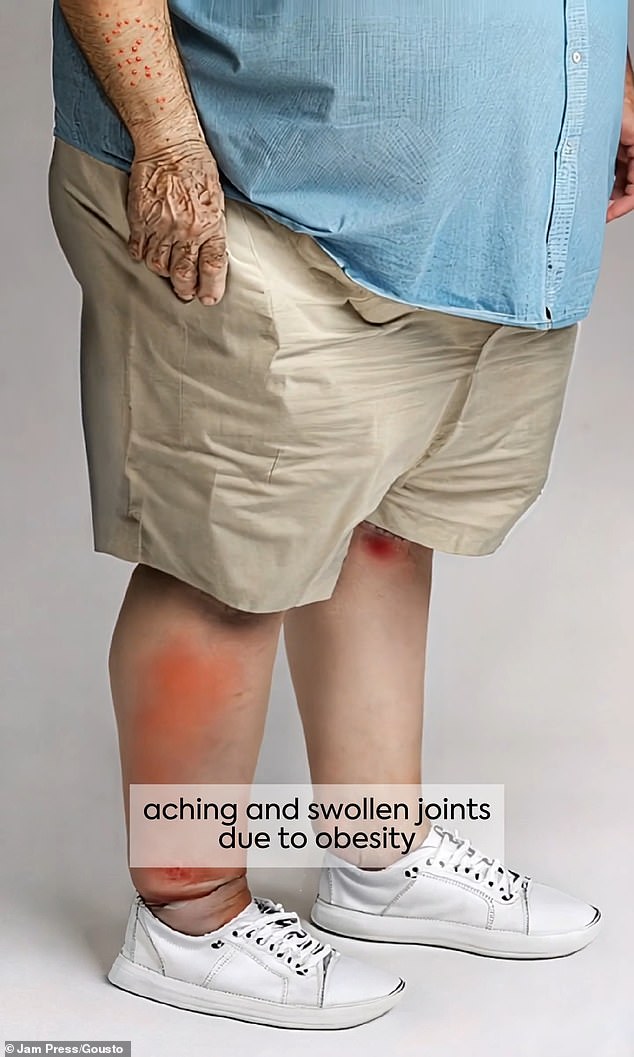
The AI ’model’ is also affected by swollen joints and infections in the skin, which are due to a lack of nutrients and obesity
“What we’re seeing in some studies is that some tumors from early-stage colorectal cancer patients harbor mutations that may have been initiated by these microbial species,” he said.
These mutations are believed to reduce the body’s ability to fight pre-cancerous cells.
Dr. Cathy Eng, a colon cancer doctor at Vanderbilt University Medical Center in Nashville, also noted that many young cancer patients also suffer from lifestyle-related conditions linked to poor nutrition, such as high blood pressure, high cholesterol and diabetes.
Matthew Lambert, nutritionist and health information and promotions manager at the World Cancer Research Fund (WCRF) told MailOnline: ‘We advise people to eat less overly processed foods that are high in saturated fat, sugar and salt.
‘This includes foods such as cakes, biscuits, pastries, crisps, sugar-sweetened drinks and fast food such as pizza and burgers.
‘These types of foods contain no fiber and virtually no essential nutrients. You should only eat it occasionally and in small quantities.’
He adds that it is not yet clear whether the risk lies in junk food itself or in the fact that it is easy to eat a lot of it, which increases the risk of weight gain.
However, it is well known that obesity is a direct cause of a number of different types of cancer – 13 according to Mr Lambert.

